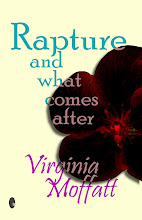At first, like everyone who's been before, you succumb to her. You don't quite know how she does it, but there is something about her that makes you feel special, needed, central to her concerns. Perhaps it is the softness of her speech that soothes your soul. Or the tilt of her head as she listens intently to your every word. Or is it the sincerity of her response to you - the way she makes you feel she's always on your side, the two of you against the world?
Other people, older and wiser than you, warn against her wiles. They point out the ways she has misled them in the past. They tell you tales of broken promises, of roads to heaven paved with wilful deceptions. The lies built on so many lies that truth is a long forgotten concept, buried deep beneath the ground. But you don't believe them. You won't believe them. How could you imagine that those wide brown eyes might be deceiving you? Or think her gentle voice is really full of guile?
It is only when your paths begin to diverge that the doubt creeps in. The moment you express an alternative point of view you detect a hardening tone of voice, a narrowing of her eyes. For months she has had you wrapped up warmly safe from bitterness and cold, but now you begin to sense a chill is in the air. Still you won't admit your fault. You don't want to admit your fault. Till even you begin to catch the faint criticism lingering behind her words of praise and your faith begins to weaken, your eyes to open.
It takes the arrival of the neophyte for you to finally succumb. To allow the truth to rise from the depths where it has lain buried under so many lies and broken promises. Your fall from grace is as rapid as his ascendancy, as the favours that were once bestowed on you are suddenly granted elsewhere. You try to warn him, but he doesn't listen. You tell him everything, but he doesn't believe you. He won't believe you. How could those wide brown eyes be decieving him, that beguiling voice be misleading him?
There is nothing you can do, except to join the others, older and wiser than you. They warned you once and though you did not heed their warning they welcome you into their ranks. All you can do is watch and wait for paths to diverge, faith to weaken, eyes to open wide.
Friday 18 May 2012
Saturday 5 May 2012
Woolf on Words
Oh this is marvellous. My heroine Virginia Woolf speaking about words in the only recording of her voice in existence http://www.youtube.com/watch?v=E8czs8v6PuI Please take a moment to listen. Hat tip to the wonderful folk at Shakespeare and Company for posting it on twitter this morning.
Tuesday 1 May 2012
We're All Different and that's OK
![[badd02.gif]](https://blogger.googleusercontent.com/img/b/R29vZ2xl/AVvXsEj6aweGX3JDqkceur_ibXfsauWtHwLGAJD9v_tUsyJj0W4KkYif8Oc4hQyiew_rCa5RotCMIw0brCtHpLIdty7VOWk7VHkvd1xL7kkChPsC4L7ywKEBzaNzWYy9Bqy_mBcOr4kLm7uR_aI/s1600/badd02.gif)
I usually use this blog to celebrate writing - fiction, drama, poetry, my own and others. But I'm making an exception today to join in Bloggers Against Disablism Day.
I have worked for and with people with learning disabilities for nearly thirty years. Although we have come a long way since people with learning disabilities were locked in institutions they, and other people, with disabilities still face a lot of discrimination. So I'm delighted to be part of BADD which is a great way to tackle disablism.
A few years ago I gave an assembly at my daughters primary school about people with learning disabilities. I told the children (aged 5-9) We are all Different, We are all Equal, We are All Special. I explained that sometimes people with disabilities weren't treated equally or seen as being as special as others. It maybe a bit cliched but children really do have an innate sense of justice, and straight away they all recognised how unfair this is.
I told them that all it takes is understanding and a bit of adjustment from those of us who do not have disabilities, and everyone can shine. I used the children's story "Amelia Bedelia" to illustrate my point. Amelia Bedelia is hired to be a housekeeper. She is keen to do well and impress her new employers, but when they go out and leave her a list of chores she is a little puzzled. "Draw the curtains," the list says, so after thinking about it, she draws them a picture of the curtains. "Dust the furniture", and she covers it with dust. She interprets "Change the towels," literally and cuts them to make them different. "Put out the lights," really stumps her till she decides, like washing, the lightbulbs need hanging out on the washing line. Her employers return and are horrified by her actions. They are on the point of sacking her until they smell her delicious lemon meringue pie. When they realise how wonderful the pie is, they ask her to stay. They are clever enough to work out how to ask her to do things her way. When she is told "Undraw the curtains" "Undust the furniture." she gets it right. In other words, instead of expecting her to be like them, they celebrate her uniqueness and adapt their behaviour to match hers.
It's a simple message. Instead of letting disability be a problem, we need to see people for who they are and make the necessary adjustments to ensure they can fully participate. The kids totally got it. Why is it so difficult for grown ups?
If you would like to do something about disablism you might want to start by checking out these fine bloggers: Benefit Scrounging Scum (Kaliya Franklin) - shortlisted for the Orwell Prize; Diary of a Benefit Scrounger (Sue Marsh); Where's the Benefit? (Collective).
Subscribe to:
Posts (Atom)
